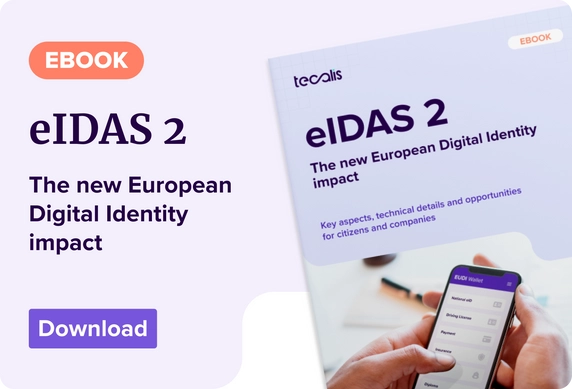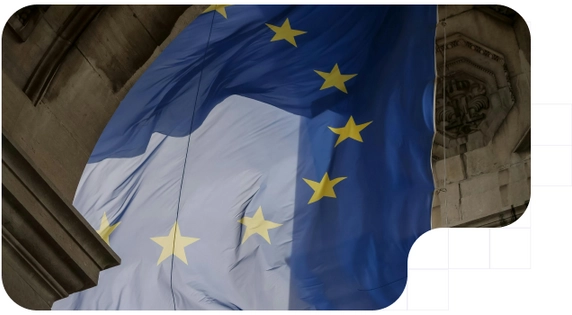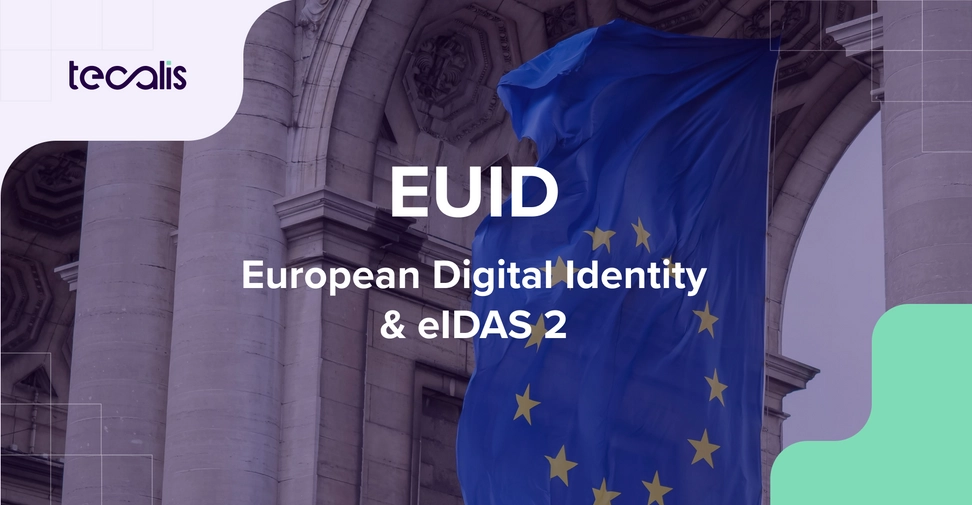Index
Get the latest news right in your inbox
The European Digital Identity framework, driven by the eIDAS 2 regulation, is a crucial milestone for the digitization of identification in the European Union (EU). This project encompasses everything from personal identification through the EUID Wallet to the identification of companies through the EUID code. The EU initiative aims to provide citizens and businesses with a unified, secure and easily accessible digital identity system.
The EUID or European Unique Identifier represents an advance in the digital identity of the European Union, which seeks to unify and standardize the identification systems of individuals and companies through digital tools such as the EUID Wallet or the EUID Code.
In this article we will explore in depth what EUID is, how it relates to the initiatives of the eIDAS 2 framework and what benefits it can bring for the identification of commercial companies in the EU, as well as its impact on the European Business Register and on the identification of citizens for public administrations and companies.


What is EUID
EUID (European Digital Identity) is a unique European Union identifier that allows citizens and businesses to establish and confirm their digital identity in a secure and standardized European-wide environment. It is part of the eIDAS (electronic IDentification, Authentication and trust Services) project, which has evolved into eIDAS 2 to provide an interoperable and accessible digital identity across the EU.
On the other hand, the EUID code, or European Unique Identifier, is an essential key in the EU's digital transformation process for unified business registration and company identification. Initially established to simplify access and interoperability of cross-border services, the EUID is a key tool to boost the European digital economy.
EUID Wallet: European Digital Identity
The EUID Wallet or European Digital Identity Wallet is an application that allows EU citizens to securely store and share their personal information, identity keys and professional data. In addition, this tool allows the management of multiple credentials, such as academic history, marital status, and professional permits, all from a single device, thus eliminating the need for multiple physical IDs.
With the EUDI Wallet, users will be able to access public and private services in any EU country (both digital and face-to-face), avoiding compatibility barriers and unnecessary verifications. This interoperability through an EUID Wallet (also called EUDI Wallet) not only improves the experience for citizens, but also optimizes business, legal and administrative processes in all sectors.
This system consists of a "digital wallet", which will include features such as the creation of qualified electronic signatures and the use of data for online and offline verifications. The implementation of the EUID Wallet for all member states is expected within 24 months of the entry into force of the eIDAS 2 implementing acts.

EUID Code for Identification of Commercial Companies in the EU
The EUID Code (European Unique Identifier Code) is an identification assigned to commercial companies registered in the European Union, allowing a standardized connection between the different commercial registries of each member country. This code allows companies to be recognized throughout the EU, thus avoiding duplications and errors in commercial databases and facilitating the authentication of corporate identity at international level.
This code is particularly relevant for cross-border business operations, as it provides a single reference that allows immediate verification of the legal existence of a company in any EU country, thus speeding up procedures such as the registration of subsidiaries or the opening of new headquarters abroad.
In addition to personal identity, the EUID code also applies to the identification of legal entities. The aim is to reduce administrative costs and speed up verification and compliance processes (due diligence and KYB) between companies at an international level.

eIDAS 2 and EUDI / EUID Wallets
With the launch of eIDAS 2, the EU seeks to expand the scope of digital identities and improve interoperability between member countries through the European Digital Identity Wallet or EUDI Wallet. This upgrade strengthens user confidence and control in the management of their digital identity.
The eIDAS 2 regulation, in force since May 2024, extends and strengthens the EU digital identification system established by the 2014 eIDAS regulation. One of its main developments is the creation of this European Digital Identity (EUDI) Wallet, designed to improve interoperability and strengthen security in electronic identification across the EU as we have seen previously.
EUID: European Digital Identity Wallet
The European Digital Identity Wallet represents a universal digital identification infrastructure within the EU, designed to offer secure and easy access to government, medical and commercial services. On the other hand, the European Unified ID concept seeks to unify under the same identification standard not only individuals, but also companies, by assigning unique codes that validate their authenticity in any transaction.
By centralizing these processes in an EUID Wallet, more secure traceability and validation of personal and professional data is achieved, allowing users to access their digital rights regardless of country of origin or residence.
The EUDI Wallet is an innovative solution that allows European citizens and residents to carry a digital version of official documents such as driving licenses, diplomas, predefined attributes or medical certificates, among many others. It also facilitates electronic signatures and identity verification without the need for physical documents. The long-term goal is for the EUDI Wallet to become an indispensable tool for accessing public and private services.
Main Features of the European Unified ID
The EUDI Wallet has been designed with three fundamental pillars: security, interoperability and usability. This system will ensure that data is controlled directly by the user and that high standards of information protection are applied. The eIDAS 2 also introduces measures in compliance with the General Data Protection Regulation (GDPR), ensuring that citizens' privacy is always protected.
The EUID Wallet and EUID Code offer numerous key features that enable more secure and universal identity management:
- Interoperability: Facilitates the connection between national digital identification systems.
- Advanced security: Data protection through encryption and multi-factor authentication.
- User control: The user has full control over what information to share and with whom.
- Accessibility: All EU citizens are expected to be able to easily access the EUID Wallet from any compatible device.
- Privacy standards: Complies with GDPR requirements to ensure that personal data is protected throughout the EU.

EUID business applications and use cases
The EUID framework enables companies to optimize customer and supplier identity verification (KYC), facilitate digital onboarding and reduce fraud. Sectors such as banking, insurance and retail have shown particular interest in these technologies. In addition, the EUID code (for KYB) provides reliable and low-cost verification, enabling secure transactions between companies and customers in different EU countries.
The EUID Wallet and EUID Code can be applied across industries and sectors, from e-commerce to financial services to government. Some notable applications include:
- Financial Services: Facilitates identity verification in account opening processes and cross-border financial services. It also helps in fraud prevention by authenticating identity quickly and securely.
- E-Commerce: Allows easier and more reliable verification of transactions, improving the user experience and reducing waiting times.
- Telecommunications: Helps companies comply with KYC (Know Your Customer) regulations in the EU by providing a verified and simplified identity.
- Public Administration: It speeds up citizens' access to services such as property registration, visa applications, or social security formalities.
- Health Sector: Allows secure access to shared medical records and authenticates the patient's identity, facilitating the exchange of health data between different EU institutions.


EU Digital Identity Benefits
The benefits of the European Digital Identity (EUDI) are manifold and range from increased transparency and security to simplified access to public and private services. Notable benefits include:
- Improved interoperability: With a single identification system, companies and users can operate throughout the EU without the need for multiple registrations in each country.
- Increased security: Digital identity ensures secure authentication, helping to prevent identity fraud and protecting sensitive user data.
- Cost reduction: By automating processes, companies and public administrations can save time and resources in identification and information verification procedures.
- Increased efficiency: EUID Wallet enables streamlined processes, improving efficiency in areas such as cross-border trade and enterprise-wide identity management.
- Privacy and control: Users are in control of their personal information and can choose what data to share, which reinforces trust and compliance with privacy regulations such as GDPR.
How to adapt: take advantage of EUID in your business
Preparing for the adoption of EUDI Wallet and EUID in the enterprise environment requires implementing compliant digital identity systems and fostering internal training in trust services with RegTech tools. Early adopters will gain an advantage in terms of operational efficiency and improve customer experience, while aligning with the security and compliance standards imposed by eIDAS 2, PSD3 and GDPR.
To prepare for the arrival and use of the EUID Wallet and EUID Code, companies may want to consider the following steps:
- Technology upgrade: Evaluate whether your identity and access management (IAM) systems meet the required interoperability and security standards.
- Staff training: Train teams in the use of digital identities and how to leverage EUID Wallets to improve efficiency and security in operations.
- Compliance assessment: Conduct compliance audits with European regulations, such as GDPR and eIDAS 2, and update online privacy and security policies.
- Integration of verification solutions: Incorporate identity verification technologies that adapt to EUID and eIDAS 2, such as the use of APIs that facilitate interoperability between systems.
- Explore EUID Wallet applications: Consider how the implementation of digital identities can optimize customer onboarding, contract management or user profiling on digital platforms.
With the implementation of the EUID and the EUID Code, the European Union is moving towards a unified digital transformation, fostering a more secure, reliable and accessible digital ecosystem for all citizens and businesses in the region. The adoption of these technologies not only represents a benefit at the administrative level, but also enables businesses in the EU to operate in a more competitive and robust digital environment.
























